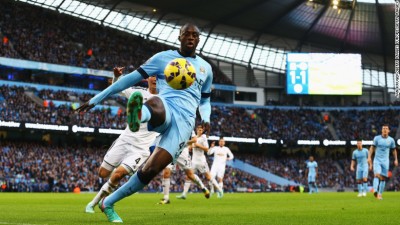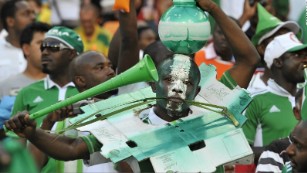
From the goals of Ivorian Yaya Toure to the trickery of Congolese Yannick Bolasie, African footballers have lit up the English Premier League season, and a new TV deal will allow African fans to watch them free of charge.
The League has announced an agreement for free-to-air broadcast rights with Econet Media, owned by Zimbabwean tycoon Strive Masiwiya, which will license matches across 50 African countries through its new platform Kwesé Sports starting with the 2016-2017 season.
“Premier League clubs enjoy passionate support across sub-Saharan Africa and these rights are important to ensuring that as many fans as possible can follow and enjoy our competition,” English Premier League Chairman Richard Scudamore said in a statement.
The new player
The deal is a coup for Econet as it prepares to launch Kwese TV later this year, with sport among the service’s flagship offerings.
“If you want to play in the media space it is important to acquire as much live content as possible,” said Econet Media CEO Joseph Hundah.
“We won’t stop here — we will pursue all sports that are popular in Africa.”
Econet owner Strive Masiwiya, Zimbabwe’s richest man, celebrated the deal in a blog post that hinted at further revelations to come.
“For competitive reasons, I will not be able to reveal certain things at this stage,” he wrote.
Kwese has already acquired rights to show matches in Spain’s Copa del Rey, as well as showpiece cricket and rugby events, but the Premier League deal represents another step up.
It is the world’s most popular domestic competition of the world’s most popular sport. TheLeague claims a TV audience of over 4 billion from 212 territories each season, worth over $7 billion a year.
Sub-Saharan Africa is one of the Premier League’s fastest-growing audiences, with an estimated276 million viewers tuning in each year. English clubs such as Chelsea have earned huge fan bases across the continent, driven by African stars such as Didier Drogba.
Strength in depth
Kwese faces a challenge to establish itself in the competitive broadcast market.
Pay TV broadcasting rights for the region are currently held by South African provider Supersport, which charges from about $40 up to $100 a month for its full premium package.
“Historically it has been a struggle to get much traction for free-to-air games,” says Gary Rathbone, industry consultant and founder of Sports News Africa. “These are not really the top matches so people will not unsubscribe from SuperSport for them.”
But Rathbone adds that Kwese’s acquisition of Premier League rights, in addition to other live soccer and sports events, could allow it to challenge the market leaders eventually.
“Kwese are laying down a marker and announcing their intentions to become a major player over time,” he says.
Robin Jellis, TV markets expert at Sports Business, agrees the new player is planning for the long term.
“Econet is expected to lose money on its Premier League deal, but it is a strategic move to build an association with the league ahead of launching Kwesé TV,” he says.
Jellis adds that Supersport is under increasing pressure from competitors such as Chinese-owned pay-TV operator StarTimes and Rupert Murdoch’s Fox International Channels.
However, increased competition may not translate to cheaper packages for supporters.
“Rights-holders increasingly regard sub-Saharan Africa as a market in which the value of their rights should be rising,” says Jellis. “This will only grow if Econet shows a strong appetite for premium sport in the coming months.”



Be the first to comment